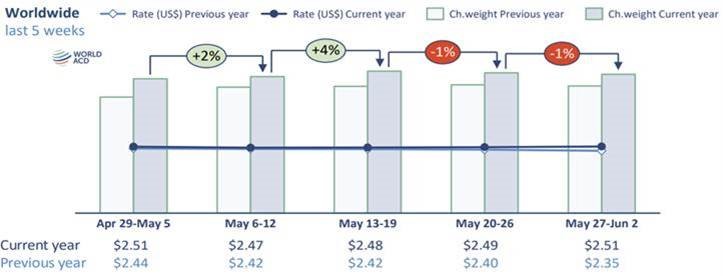EXTRANS GLOBAL - Air Freight News - Week 24 2024
Air Cargo General
1) T'way Air, finally arrives in Paris after many obstacles!

-
According to recent reports, it appears that an agreement has been reached between the South Korean and French aviation authorities regarding the Paris route. It is expected that T'way Air will be able to operate flights to Paris starting from August. However, it seems practically difficult to take advantage of the special opportunities presented by the upcoming Paris Olympics scheduled for the end of July.
-
Last month, the Ministry of Land, Infrastructure and Transport agreed to temporarily allow three domestic airlines, including Korean Air, Asiana Airlines, and T'way Air, to operate flights on the Paris route in coordination with the French government. This agreement was made without revising the air service agreement itself until the merger of Korean Air and Asiana Airlines, which is subject to approval by the European Union (EU), is finalized. As part of this agreement, an exception was made to allow T'way Air to operate flights to Paris.
-
T'way Air stated, "With the completion of the agreement between the South Korean and French aviation authorities regarding the Paris route, it is now possible to operate flights. As soon as the confirmed operating dates, taking into account the flight schedule for both routes, are determined, we plan to start selling tickets."
-
Considering the current schedule, it is expected that it will be difficult for flights to commence in early July, despite overcoming major obstacles in the aviation industry. From July 26th to August 11th, the Paris Olympics will take place, making it challenging for T'way Air, which had hoped to benefit from the event, to start selling tickets shortly before or after the Olympics.
-
An official from the Ministry of Land, Infrastructure and Transport mentioned, "The key factor is when the airlines apply for the timing of their flights. However, even if they try to advance the schedule, it seems unlikely that flights will commence in early July," and added, "We tentatively expect flights to start in August or later."
-
Since the signing of the aviation agreement in 1974, only a single national carrier (Korean Air) operated flights on the Paris route for 34 years until 2008 when the agreement was expanded to include two Korean airlines, Korean Air and Asiana Airlines. In April of this year, the French authorities opposed T'way Air's additional flights to Paris as it violated the existing agreement, which was part of the merger process between Korean Air and Asiana Airlines. Negotiations between South Korea and France have been conducted to ensure the smooth operation of T'way Air.
-
T'way Air plans to operate flights to Paris using an A330-200 aircraft (246 seats) leased from Korean Air.
-
On the other hand, starting from today, T'way Air will begin selling tickets for flights on the Incheon-Rome and Incheon-Barcelona routes. Flights on the Rome route will operate three times a week (Tuesday, Thursday, and Sunday) starting from August 8th, while flights on the Barcelona route will operate three times a week (Monday, Wednesday, and Friday) starting from September 11th. Both routes will be serviced by A330-200 aircraft. Additionally, T'way Air plans to launch its first flight on the Frankfurt route in Germany in mid-October.
2) Hanjin, a South Korean company, has announced its plans to expand its global forwarding business by more than double by 2027

-
Hanjin aims to strengthen its global forwarding logistics capabilities by utilizing overseas logistics hubs and infrastructure.
-
The company plans to expand its specialized cargo transportation and diversify its operations by increasing its long-term strategic industries on a continental basis. It also aims to enhance its integrated logistics operations and focus on growing its global forwarding business from its current size of 120 billion won to approximately 300 billion won by 2027.
-
The global forwarding business involves providing efficient transportation services, combining air and trucking, to swiftly deliver goods to target regions through optimized transportation designs based on routes.
-
In recent times, the global forwarding market has shown signs of overheating, with domestic markets facing profitability challenges due to oversupply and price competition. Meanwhile, international markets exhibit varying market conditions for sea and air transportation, with increased demand for solar cells, auto parts, and electronic cigarettes due to the booming e-commerce sector in the United States, as well as a surge in demand for combined sea and air transportation between Asia and Europe.
-
Hanjin plans to diversify its business by expanding into specialized cargo transportation sectors such as pharmaceuticals and batteries, while also significantly expanding its integrated logistics operations using overseas hubs. The company aims to develop logistics infrastructure and strategic industries on a continental and country-specific level.
-
Additionally, it seeks to expand its market presence by increasing garment, solar cell, and cosmetics transportation volumes from China and boosting used car exports to Mongolia and Central Asia from 600 million won to 10 billion won in the first half of this year.
-
Furthermore, Hanjin plans to strengthen its forwarding, transportation, and warehouse integration operations using overseas hubs in the Americas, Europe, and Southeast Asia. It also intends to significantly expand its combined sea and air transportation volumes to meet the increasing trend of China's transit mail, aligning with the growth in the market demand.
3) EU e-commerce: EU also strengthens regulations on e-commerce," Temu also designated as a 'Giant Online Platform (VLOP)

-
The US CBP's extensive seizure of Chinese e-commerce products has led to increased pressure in the European Union (EU), which has designated Temu as a Giant Online Platform (VLOP) and applied stricter regulations.
-
According to industry sources, while this VLOP designation does not directly impact Temu's current logistics services, there is a possibility of it facing challenges in certain demand areas if intangible pressure from the EU intensifies in the future.
-
Market observers believe that thorough investigations into low-cost products with a high likelihood of counterfeits or illegal goods are possible grounds for pressuring Temu. However, it is assessed that these measures alone will not significantly affect Temu's market share, considering recent purchasing trends among EU consumers.
-
Nevertheless, this action has garnered attention as the United States and Europe are both starting to target Chinese e-commerce. European consumer organizations have already raised concerns about Temu's alleged lack of sufficient tracing capabilities for sellers and products, with some even suggesting evidence of manipulation. They argue that Temu should now be investigated for violations of the EU's new online content-related law, the Digital Services Act.
-
Furthermore, like the United States, there is also consideration to abolish the minimum €150 tax exemption threshold. This comes after previous research concluded that around 65% of e-commerce goods were undervalued from a customs perspective. However, the sentiment within the EU is leaning towards discontent with Chinese e-commerce distorting market competition and the minimum duty exemption being more advantageous to non-EU retailers compared to EU retailers.
-
On another note, VLOP stands for "Very Large Online Platform" and is a term used in the EU's Digital Services Act (DSA) and Digital Markets Act (DMA).
-
Generally, VLOP refers to online platforms with a large number of users, typically meaning platforms with over 45 million users worldwide. Through legislation, VLOPs are subjected to specific obligations and responsibilities to ensure user protection and foster a fair competitive environment.
-
Once designated as a VLOP, transparency obligations, risk management, data access permissions, algorithm explanations, and user complaint rights must be ensured.
4) 22nd week logistics trends

-
In the 22nd week (May 27th - June 2nd), the global average air cargo freight stood at $2.51/kg, maintaining overall stability in freight rates, while tonnage decreased by -1% compared to the previous week.
-
Due to strong demand and disruptions in the Hong Kong Sea, the average spot freight for Europe-bound shipments from the Middle East/South Asia in May was $3.35/kg, more than double compared to the same period last year.
-
India recorded a significant increase in spot freight to Europe, rising by 160% year-on-year to $3.78/kg. Bangladesh saw a 189% increase in spot freight to Europe, reaching $4.38/kg.
-
Spot freight rates in Sri Lanka and Dubai are also showing an upward trend.
-
From departure airports like Mumbai, Delhi, Chennai, and Bengaluru, as well as major transit hubs in the Middle East, there is a persistently high volume of cargo leading to congestion.
-
Considering the surge in container freight rates, it is expected that air cargo rates will follow a positive trend. Air cargo rates in June are also anticipated to align with container rates.
-
In the Asian region, demand in May recorded a 21% increase compared to the previous year, marking the highest year-on-year growth since January.
-
When comparing the demand of the 21st and 22nd weeks with the previous two weeks, there was no significant fluctuation globally, with increases observed in Asia-Pacific (+2%), Europe (+1%), and the Middle East/South Asia (+1%). Regions such as Africa (-3%), Central and South America (-3%), and North America (-5%) experienced a decline in demand.
-
However, it is evident that the congestion and delays caused by the Hong Kong Sea situation stimulated an increase in maritime freight rates for shipments from the Far East to Europe and the United States, impacting the air cargo market. Nonetheless, the potential for a modal shift to air cargo remains very limited.
5) Airline/GSA Event update
(1) Acquisition of Asiana Airlines (OZ) Cargo Division by Air Incheon
Air Incheon has been selected as the preferred negotiator for the acquisition of Asiana Airlines' cargo division.
The European Commission reviewed the acquisition, including the funding and business implementation plans of Air Incheon, Premia, and Eastar Jet, and evaluated Air Incheon's proposed future operational plans for cargo business as the most favorable option.
(2) Cargojet to Operate 3-Year Charter Flights from Hangzhou to Vancouver
Cargojet, a Canadian cargo airline, has entered into a 3-year contract with Hong Kong logistics company Great Vision HK Express to operate regular charter flights between Hangzhou, China, and Vancouver.
This contract is structured as an Aircraft, Crew, Maintenance, and Insurance (ACMI) charter agreement. Through this partnership, Cargojet will provide a weekly capacity of approximately 11,340 tons of cargo.
(3) T'way Air (TW) to Start Rome and Barcelona Routes
Starting from August 8th, T'way Air will operate flights to Rome (FCO) and from September 11th, to Barcelona (BCN). The flights will be operated with three A330-200 aircraft.
ICN-FCO 3W (D247) TW405 1235/1915, FCO-ICN 3W (D247) TW406 2115/1610 A330-200, starting from August 8th.
ICN-BCN 3W (D135) TW407 1105/1850, BCN-ICN 3W (D135) TW408 2050/1610 A330-200, starting from September 11th.
(4) Saudi Arabian Airlines (SV) to Operate Direct Flights between Incheon and Riyadh
Starting from June 23rd, 2024, Riyadh-Incheon flights SV896/SV898/SV899 will be operated as direct flights.
(5) Expansion of Etihad Cargo's Summer Schedule Belly Capacity
Etihad Cargo recently announced the expansion of its summer operating schedule, adding 23 flights per week to 8 new destinations in addition to the existing 70 flights per week to passenger aircraft destinations, totaling over 100 passenger flights.

top



